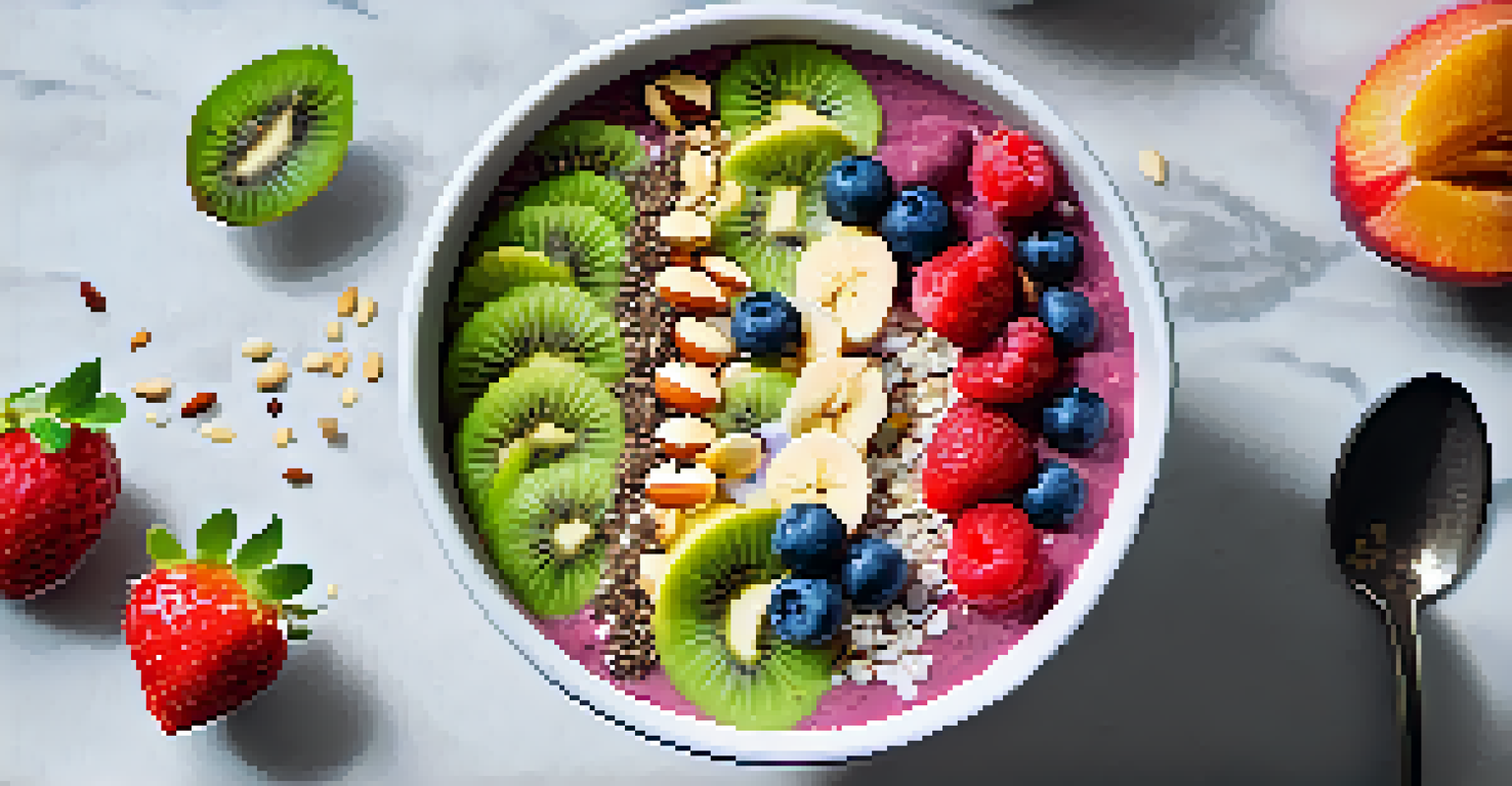Health Benefits of Raw Veganism: What to Expect and More

What is Raw Veganism and Why Choose It?
Raw veganism is a lifestyle that combines the principles of veganism with the consumption of uncooked, unprocessed foods. This means that followers eat fruits, vegetables, nuts, seeds, and sprouted grains, while avoiding animal products and cooked foods. Many choose this diet for its potential health benefits, ethical considerations, or environmental impact.
Let food be thy medicine and medicine be thy food.
Choosing raw veganism can lead to a variety of positive changes in your body and mind. Many people report increased energy levels, improved digestion, and clearer skin as they transition to this plant-based diet. By consuming whole, nutrient-dense foods, you can provide your body with the vitamins and minerals it craves.
However, it’s important to approach this lifestyle mindfully. A well-planned raw vegan diet can be incredibly beneficial, but it may require some adjustments to ensure you’re meeting your nutritional needs. Consulting with a healthcare professional or a nutritionist is a smart move before diving in.
Enhanced Nutrient Intake: The Power of Raw Foods
One of the main advantages of raw veganism is the enhanced nutrient intake from fruits and vegetables in their natural state. When foods are cooked, some nutrients, particularly water-soluble vitamins like Vitamin C, can be diminished. By consuming these foods raw, you maximize their nutritional value.

In addition to vitamins, raw foods are often rich in antioxidants, which help combat free radicals in the body. This can lead to a stronger immune system and a reduced risk of chronic diseases. Think of it as giving your body a natural shield against illness.
Raw Veganism Boosts Nutrient Intake
Eating raw foods maximizes vitamins and antioxidants, promoting better health and a stronger immune system.
Moreover, raw vegan diets tend to be high in dietary fiber, aiding digestion and promoting a healthy gut. This can help in maintaining a healthy weight, as fiber-rich foods keep you feeling fuller for longer, reducing the temptation to snack on processed foods.
Weight Management: Raw Veganism and Healthy Eating
If you’re looking to manage your weight, raw veganism can be an effective approach. The abundance of fresh fruits and vegetables, paired with minimal calorie-dense processed foods, makes it easier to maintain a lower calorie intake. This dietary shift can lead to gradual, sustainable weight loss.
You are what you eat, so don't be fast, cheap, easy, or fake.
Additionally, the high fiber content in raw vegan foods promotes satiety, helping you feel full without overeating. Imagine feeling satisfied after a meal of colorful salads and smoothies, rather than heavy, calorie-laden options. This can change the way you see food and hunger.
That said, it’s essential to focus on whole, nutrient-rich foods rather than simply eating less. Incorporating a variety of foods ensures your body gets the necessary nutrients while supporting your weight management goals.
Increased Energy Levels: The Boost from Raw Foods
Many people who adopt a raw vegan diet report a significant increase in energy levels. This can be attributed to the high intake of vitamins, minerals, and enzymes found in raw foods. These nutrients help fuel your body efficiently, leading to a more vibrant lifestyle.
Raw foods are also typically lower in unhealthy fats and sugars, which can cause energy crashes. By focusing on whole foods, you provide your body with steady energy throughout the day. Imagine trading in that afternoon slump for a sustained burst of energy!
Raw Foods Enhance Energy Levels
A raw vegan diet fuels the body with steady energy, helping to maintain vitality throughout the day.
However, it's important to listen to your body during this transition. Some may initially feel fatigued as their bodies adjust to the new diet. Ensuring proper hydration and eating a variety of foods can help maintain energy levels during this period.
Improved Digestion: Benefits of High Fiber Diets
One of the standout benefits of a raw vegan diet is improved digestion. The high fiber content found in fruits, vegetables, nuts, and seeds helps regulate bowel movements and supports gut health. This can lead to a decrease in digestive issues like bloating or constipation.
Fiber acts like a natural broom for your digestive system, sweeping out waste and promoting a healthy microbiome. With a balanced microbiome, your body can better absorb nutrients, leading to improved overall health. It's like giving your gut a fresh start!
As you transition to a raw vegan diet, you may notice changes in your digestion almost immediately. Many people report feeling lighter and more comfortable after meals, as their bodies become accustomed to a fiber-rich diet.
Mental Clarity and Mood Enhancement: The Mind-Gut Connection
Raw veganism can also have a positive effect on mental clarity and mood. The nutrients found in whole, raw foods can support brain health, leading to improved cognitive function and emotional well-being. This is often referred to as the mind-gut connection, highlighting how what we eat influences how we feel.
Foods rich in antioxidants and omega-3 fatty acids (found in certain raw seeds and nuts) can help reduce inflammation in the brain. This reduction in inflammation is linked to better memory and focus. Think of it as giving your brain the fuel it needs to operate at its best.
Mindful Transition is Crucial
Careful planning is essential to meet nutritional needs and navigate social situations while adapting to a raw vegan lifestyle.
Moreover, many individuals report feeling a sense of lightness and positivity as they shift to a raw vegan lifestyle. The act of nourishing your body with wholesome foods can have a ripple effect on your mental health, leading to increased happiness and overall life satisfaction.
Potential Challenges: What to Watch For
While there are many benefits to raw veganism, it's important to be aware of potential challenges. One common hurdle is ensuring you receive adequate protein and essential nutrients, such as Vitamin B12, iron, and calcium. These nutrients are often found in animal products, so it requires careful planning to obtain them from plant sources.
Another challenge many face is the social aspect of eating. Dining out or attending events may present difficulty when raw vegan options are limited. It’s helpful to prepare in advance or communicate your dietary needs to ensure you have suitable options.

Lastly, transitioning to raw veganism can be a significant lifestyle change. It may take time for your body to adjust, and cravings for cooked foods can arise. Patience and persistence, along with a supportive community, can make this transition smoother.